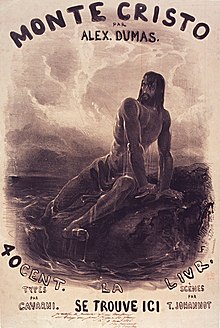I had somehow quit reading for a while and I just decided to reprise my role as a reader and, strange though it may seem, I have decided to read French literature...yet in English. It seems that my library doesn't have many books to offer... ! Anyway, I bumped into one of the French literature masterpieces, no other than the Count of Monte Cristo by Alexander Dumas. I'm sure you are somehow familiar with this book, since there have been multiple adaptations including films, and TV series and serials. Let's begin by analyzing this work of art.


The story is set in the Bourbon Restoration just when Napoleon returned to power from the exile. In this perfect historic background, Dumas unleashed a powerful, overwhelming story of vengeance and violence developing thanks to a riveting plot.
 From that moment, and thanks to his money, Edmond takes on the new identity of Count of Monte Cristo and he manages to be introduced in the lives of his enemies. Engaging on new identities and enacting intrigues and complicated plots, he manages to make his enemies fall in disgrace and pay for their wrongdoings by exposing their darkest secrets. Edmond gets his revenge...but at a high cost.
From that moment, and thanks to his money, Edmond takes on the new identity of Count of Monte Cristo and he manages to be introduced in the lives of his enemies. Engaging on new identities and enacting intrigues and complicated plots, he manages to make his enemies fall in disgrace and pay for their wrongdoings by exposing their darkest secrets. Edmond gets his revenge...but at a high cost.The main topic in the book is the leitmotiv of revenge. Vengeance infuses life in Edmond. He lives to make their enemies pay for what they did to him. As the famous idiom states, "revenge is a dish best served cold." Edmond is patient and does not mind waiting for the best moment to execute his long-awaited plans. He has carefully prepared the best possible scenarios and, what is more important, he has the money and position to make it all happen. His thirst for revenge is unstoppable, as he said :“Hatred is blind; rage carries you away; and he who pours out vengeance runs the risk of tasting a bitter draught. They want retaliation against the people who harmed him : “Moral wounds have this peculiarity - they may be hidden, but they never close; always painful, always ready to bleed when touched, they remain fresh and open in the heart.”
 The book somehow speaks about the power of money and the position of men. With money, one can do whatever they want. Were it not for money, his plan for revenge couldn't have been successfully carried out. This is a demolishing message : the poor are unable to avenge their loved ones. Revenge and payback are only available for wealthy people, people with a high position.
The book somehow speaks about the power of money and the position of men. With money, one can do whatever they want. Were it not for money, his plan for revenge couldn't have been successfully carried out. This is a demolishing message : the poor are unable to avenge their loved ones. Revenge and payback are only available for wealthy people, people with a high position. Intelligence also plays an important role in his revenge.
Another topic present throughout the book is the concept of divine justice. ” Edmond is convinced that he can enact his plan thanks to God. What is more, he feels that his escape from prison, his wealth and his plans of vengeance are God's decision. God chose him to punish his sinful enemies. Edmond conceives that he is being aided by God himself. This somehow implies that vengeance is not a sin, but, rather, a divine right.
However, the somber tone in the book also gives way to an optimistic angle. As Edmond says, “it's necessary to have wished for death in order to know how good it is to live.” Although the main character just wants to enact his revenge, he somehow cherishes his life more than ever.
Well, I hope I have encouraged you to read this thrilling story. Next week, I will write an entry dealing with vocabulary related to vengeance in English. Anyway, let's finish with the optimistic final sentence in the book “All human wisdom is contained in these two words - Wait and Hope.”
P.S. If you are interested in some other book reviews, click on the links to read my review on William Golding's The Lord of the Flies, my analysis of Defoe's Robinson Crusoe, my post on Dickens's Oliver Twist, and my entry about Hemingway's The Old Man and the Sea.
Have a nice week.

No comments:
Post a Comment